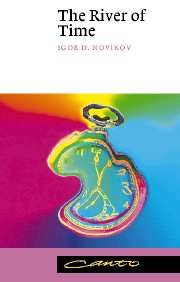Book contents
- Frontmatter
- Contents
- Preface to the Russian edition
- Preface to the English edition
- 1 Origins of thinking about time
- 2 Science of time is born
- 3 Light
- 4 The pace of time can be slowed down!
- 5 Time machine
- 6 Time, space and gravitation
- 7 Holes in space and time
- 8 Energy extracted from black holes
- 9 Towards the sources of the river of time
- 10 Journey to unusual depths
- 11 Grand Unification
- 12 Sources
- 13 What produces the flow of time and why in a single direction only?
- 14 Against the flow
- 15 Can we change the past?
- Conclusion
- Name index
- Subject index
1 - Origins of thinking about time
Published online by Cambridge University Press: 04 May 2010
- Frontmatter
- Contents
- Preface to the Russian edition
- Preface to the English edition
- 1 Origins of thinking about time
- 2 Science of time is born
- 3 Light
- 4 The pace of time can be slowed down!
- 5 Time machine
- 6 Time, space and gravitation
- 7 Holes in space and time
- 8 Energy extracted from black holes
- 9 Towards the sources of the river of time
- 10 Journey to unusual depths
- 11 Grand Unification
- 12 Sources
- 13 What produces the flow of time and why in a single direction only?
- 14 Against the flow
- 15 Can we change the past?
- Conclusion
- Name index
- Subject index
Summary
Ever since I started reading popular science books on physics, I have regarded it as self–evident that time is synonymous with empty duration, that it flows like a river and carries in this flow all events without exception. This stream is unalterable and unstoppable, going in a never–changing direction: from the past to the future.
It seemed that this interpretation, given our knowledge about the surrounding world, was unavoidable.
I learnt only many years later that people had not always held such or similar intuitive notions - far from it.
Heraclitus of Ephesus, a philosopher in ancient Greece who lived at the end of the 6th century bc, appears to have been one of the first thinkers of antiquity who set forth a belief that everything in the world changes and that this changeability is the highest law of nature (all things are in process and nothing stays still). Heraclitus set out his view in the book About Nature, of which only a few fragments survived and reached us (Cosmic Fragments).
Heraclitus taught that the world is full of contradictions and variability. All things undergo changes. Time flows relentlessly, and everything that exists moves with this unstoppable stream. The skies move, physical bodies move, a human's feelings and consciencemove as well. ‘You cannot enter twice into one and the same river’ said he, ‘because its water is constantly renewed.’ Things come to replace other things.
- Type
- Chapter
- Information
- The River of Time , pp. 1 - 12Publisher: Cambridge University PressPrint publication year: 2001

